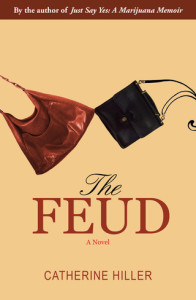
by Yona Zeldis McDonough
Female Friendship and Competition in a Novel of the 90s
Lilith’s Fiction Editor Yona Zeldis McDonough talks with author Catherine Hiller about her sharp, smartly observed period novel that deals with female friendship, office edition.
 YZM: Why did you choose to set the novel in the 1990s?
YZM: Why did you choose to set the novel in the 1990s?
CH: It was a pivotal time in American life, when email, digital cameras, and cell phones were coming into common use. I wanted to dramatize the impact of these digital technologies. For instance, the book opens with Nikki opening her email at work (she doesn’t have email at home) and seeing a message and an attachment from an unfamiliar address. She idly opens the attachment to find it is a photograph of herself and two men, naked. She’d been drugged and raped on a business trip but hadn’t known she’d been photographed.
YZM: It’s a horror that’s all too real these days, but you also use these emergent technologies to lighten the tone.
Roberta is an early cell phone user, earning Nikki’s scorn: “When did interested clients need to get hold of you at that very moment or the deal would fall through?” I found it amusing to make Nikki, who is much like me, a dunce about technology. She says, “I think the Internet is just a big hype.” Her younger sister, who works at a search engine company, says with a smirk, “Trust me. It’s not.” I felt readers might enjoy reliving those days.
YZM: What about Roberta’s Orthodox background defines her character?
CH: She is the third of three daughters, and her Orthodox parents pay much more attention to her younger brother, the sole male, although Roberta is much brighter. So she has a chip on her shoulder and gets angry easily at perceived insults from others. Also, her other sisters marry and have children, while Roberta is single well into her thirties and feels her parents favor their other daughters. Her parents are shocked at how much wine she drinks at dinner, but she feels she must fortify herself against their scorn.
YZM: Do you think the competition between women expresses itself differently than it does between men?
CH: Absolutely! Men often channel their anger through sports. Or if they are truly enraged, they might strike a physical blow. Or just avoid each other. Women are more subtle, and they stay angry longer. They may feel worse when they are disliked. They brood and they plan. In the novel, it’s basically a woman-only company. I actually think both men and women behave better and more civilly when they are together.
YZM: Do you feel women can be true friends in the workplace?
CH: Of course they can! Being under stress, whether in the office or the army, binds people together, and being in same endeavor is another bond. Our colleagues tend to be culturally and educationally similar to ourselves, and “work friends” often become real friends. But it’s also true that in most offices there is some feud going on, usually between women. Sometimes they haven’t spoken for years, and the cause of their initial quarrel is often something trivial.
YZM: Can you reflect on the real life feud that sparked the idea for this novel?
CH: I was new at a job and became friends with a more experienced saleswoman. We had lunch together, and she taught me many useful things. I did notice her irrational hatred of another saleswoman, but my friend was fun and smart and I let it go. A few years in, however, she decided she hated me as well, and after that, we never spoke. It never went beyond that, and I’m afraid that in creating a more interesting and dramatic escalation of their feud, I’ve forgotten the particulars of my actual feud, which ended only when I left the job, a dozen years ago. For instance, I can’t remember what started it, and I don’t think my antagonist had a problem with alcohol. In real life, there was no rape, no photo, no arrest, no eviction, no broken romance, no stuck elevator. But I know what it’s like to feel hated and betrayed by a woman friend. I think we all do.
The views and opinions expressed in this article are the author’s own and do not necessarily reflect those of Lilith Magazine.
